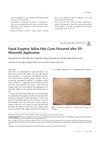 28 citations,
November 2013 in “The journal of investigative dermatology/Journal of investigative dermatology”
28 citations,
November 2013 in “The journal of investigative dermatology/Journal of investigative dermatology” GMG-43AC may help reduce unwanted hair growth and treat certain hair loss conditions.
16 citations,
April 2020 in “Dermatology practical & conceptual” Laser treatment can effectively reduce unwanted hair growth, particularly for people with fair skin and dark hair.
 1 citations,
May 2019 in “Cytotherapy”
1 citations,
May 2019 in “Cytotherapy” The new ddPCR method reliably detects unwanted viruses in CAR-T cell products, ensuring their safety for patients.
 December 2020 in “Lasers in Surgery and Medicine”
December 2020 in “Lasers in Surgery and Medicine” Laser safely and effectively removes unwanted scalp micropigmentation.
 73 citations,
April 2013 in “Stem cells”
73 citations,
April 2013 in “Stem cells” LGR5 helps maintain corneal cell characteristics and prevents unwanted changes by controlling specific cell signaling pathways.
 51 citations,
October 1980 in “The New England Journal of Medicine”
51 citations,
October 1980 in “The New England Journal of Medicine” Minoxidil lowers blood pressure effectively but may cause unwanted hair growth and other side effects.
17 citations,
January 2004 in “European journal of obstetrics, gynecology, and reproductive biology/European journal of obstetrics & gynecology and reproductive biology” Certain hormone medications can treat symptoms like acne and unwanted hair, regulate periods, and prevent pregnancy in women and teenage girls.
3 citations,
January 2003 in “Facial plastic surgery” Laser hair removal is a noninvasive way to reduce unwanted hair long-term.
 1 citations,
September 2016 in “PubMed”
1 citations,
September 2016 in “PubMed” Using finasteride 0.5% solution with laser therapy significantly reduces unwanted facial hair in women.

Choose oral contraceptives with specific side effects to manage issues like acne and avoid unwanted effects.
 1 citations,
March 2010 in “CRC Press eBooks”
1 citations,
March 2010 in “CRC Press eBooks” Some hair care products may improve hair growth and appearance, and botanicals can also help remove unwanted hair.
 October 2024 in “International Journal of Dermatology”
October 2024 in “International Journal of Dermatology” Oral and topical minoxidil are equally effective for hair loss, but oral minoxidil causes more unwanted hair growth.
 September 2024 in “Journal of the American Academy of Dermatology”
September 2024 in “Journal of the American Academy of Dermatology” Oral minoxidil is easier to use and more satisfying for hair loss treatment but may cause more unwanted hair growth.
 January 2023 in “Skin appendage disorders”
January 2023 in “Skin appendage disorders” Low-dose oral minoxidil may help treat hair loss but is not FDA-approved and can cause side effects like unwanted hair growth and heart issues.
 7 citations,
September 2020 in “Journal of The American Academy of Dermatology”
7 citations,
September 2020 in “Journal of The American Academy of Dermatology” Low-dose oral minoxidil for hair loss can cause mild excessive hair growth, usually appearing within the first 3 months, but it can be managed by adjusting the dose or removing the unwanted hair, with most people not needing to stop the treatment.
 4 citations,
January 2011 in “International Journal of Trichology”
4 citations,
January 2011 in “International Journal of Trichology” Accidental findings have led to new hair treatment discoveries, like using blood pressure and diabetes medications for hair loss and unwanted hair.
 August 2016 in “Journal of Investigative Dermatology”
August 2016 in “Journal of Investigative Dermatology” Some men don't respond to common hair loss treatments, but a new inhibitor, FOL-005, shows promise for targeting unwanted hair growth.
 3 citations,
January 2018 in “Annals of Dermatology”
3 citations,
January 2018 in “Annals of Dermatology” A woman developed facial hair cysts after using a 3% minoxidil solution for hair loss, which disappeared after stopping the treatment and removing the cysts surgically.
1 citations,
March 2012 in “Journal of pediatric & adolescent gynecology” A young girl with high testosterone was thought to have a tumor but actually had PCOS, which was treated with birth control pills.
 July 2024 in “Journal of Investigative Dermatology”
July 2024 in “Journal of Investigative Dermatology” Most women continued using oral minoxidil for hair loss despite mild to moderate side effects.
Laser hair removal works well for light skin with dark hair but needs caution for darker skin.
125 citations,
February 2007 in “Journal of the American Academy of Dermatology” Combining eflornithine cream with laser treatment removes facial hair better than laser alone.
11 citations,
March 2012 in “Journal of the American Academy of Dermatology” Most patients with dark skin were satisfied with laser hair removal and had few complications.
November 2015 in “Springer eBooks” Laser hair removal can be effective for people with darker skin tones.
July 2002 in “Journal of Cosmetic Dermatology” Laser and Eflornithine are more effective for hair removal than traditional methods.
April 2018 in “Pharmaceutical and biological evaluations” PCOS is a common hormonal disorder in women that can be managed with medication and lifestyle changes like exercise and weight control.
143 citations,
January 2013 in “Dermatologic surgery” In-office laser hair removal works well long-term, especially Nd:YAG for darker skin, but home devices need more testing.
133 citations,
July 2006 in “International Journal of Dermatology” The cream effectively and safely reduces facial hair in women.
 105 citations,
May 2011 in “The journal of investigative dermatology/Journal of investigative dermatology”
105 citations,
May 2011 in “The journal of investigative dermatology/Journal of investigative dermatology” Activating TRPV3 stops human hair growth.
 19 citations,
November 2012 in “British Journal of Dermatology”
19 citations,
November 2012 in “British Journal of Dermatology” Dopamine stops hair growth and pigment production in human scalp hair follicles.


















